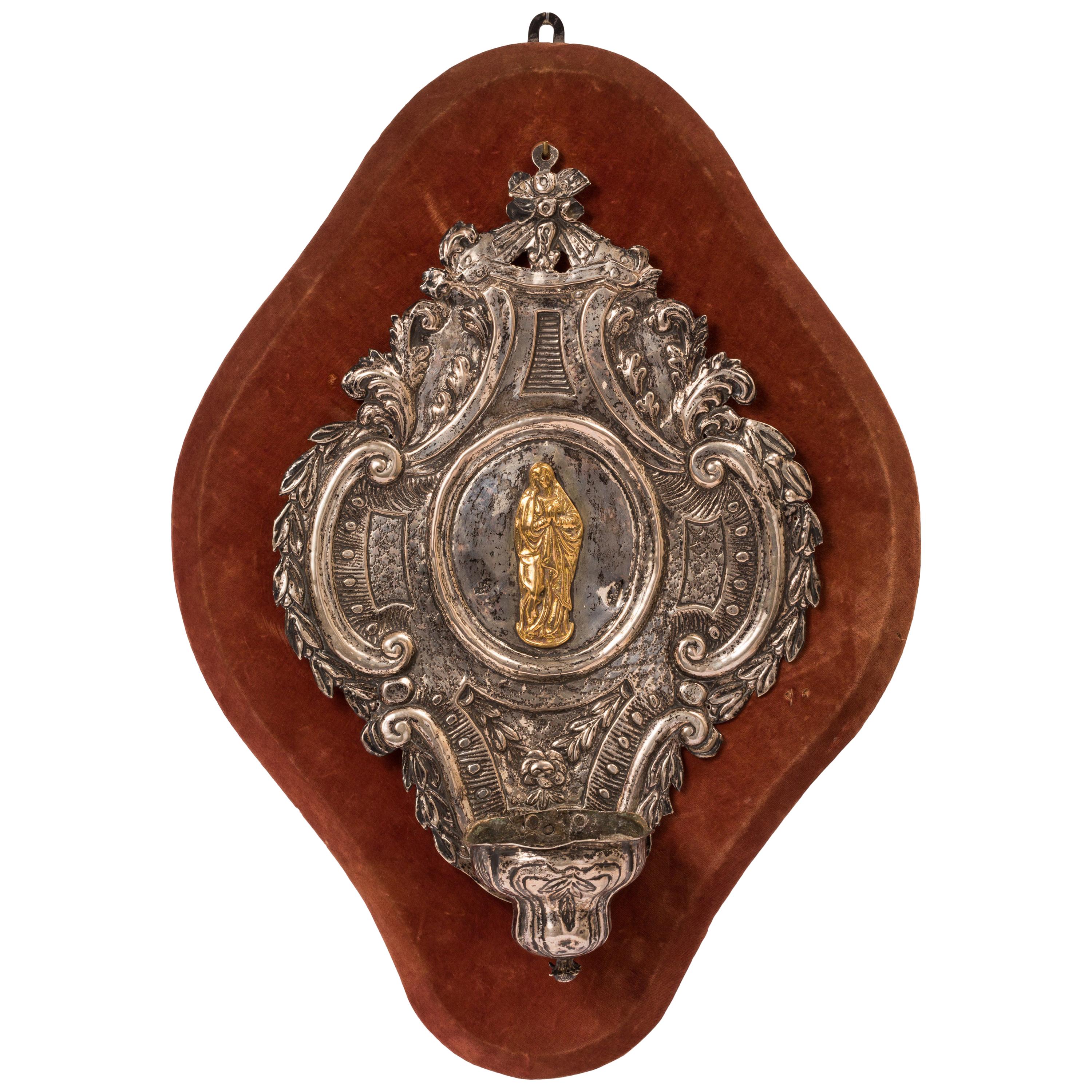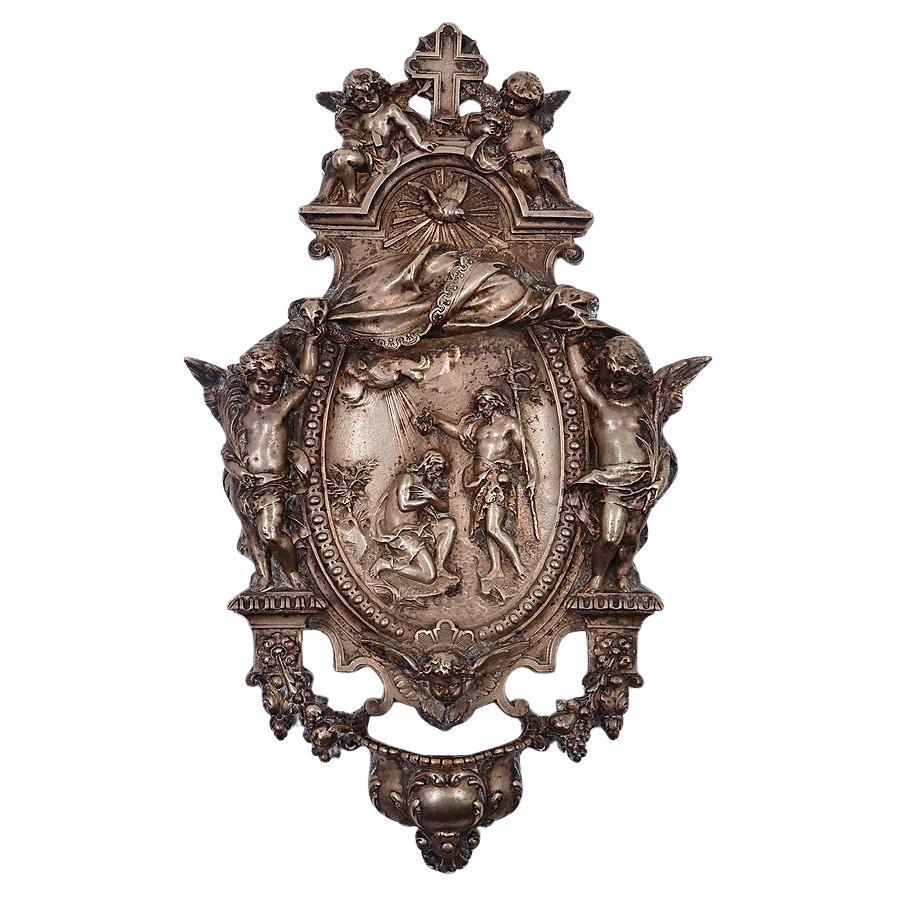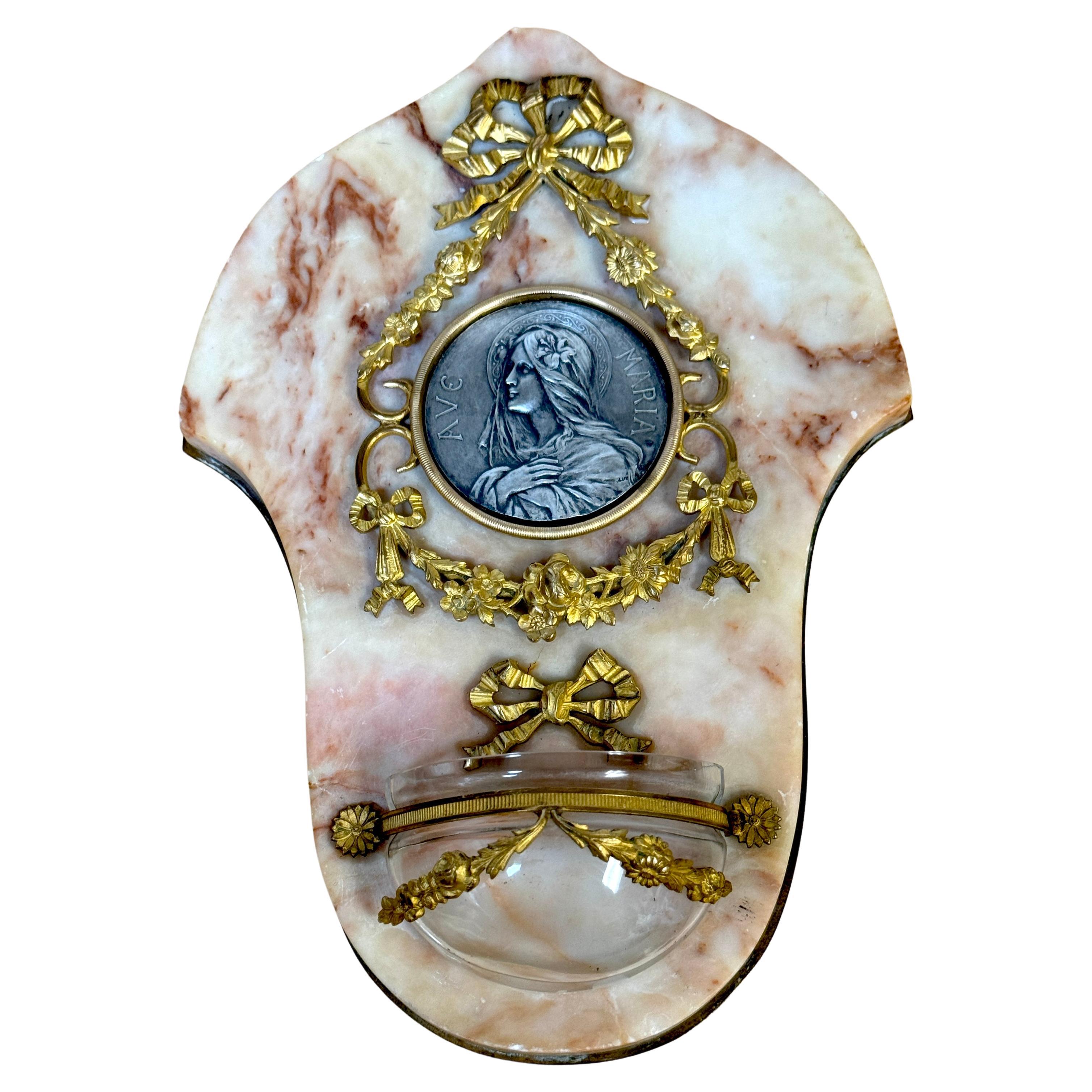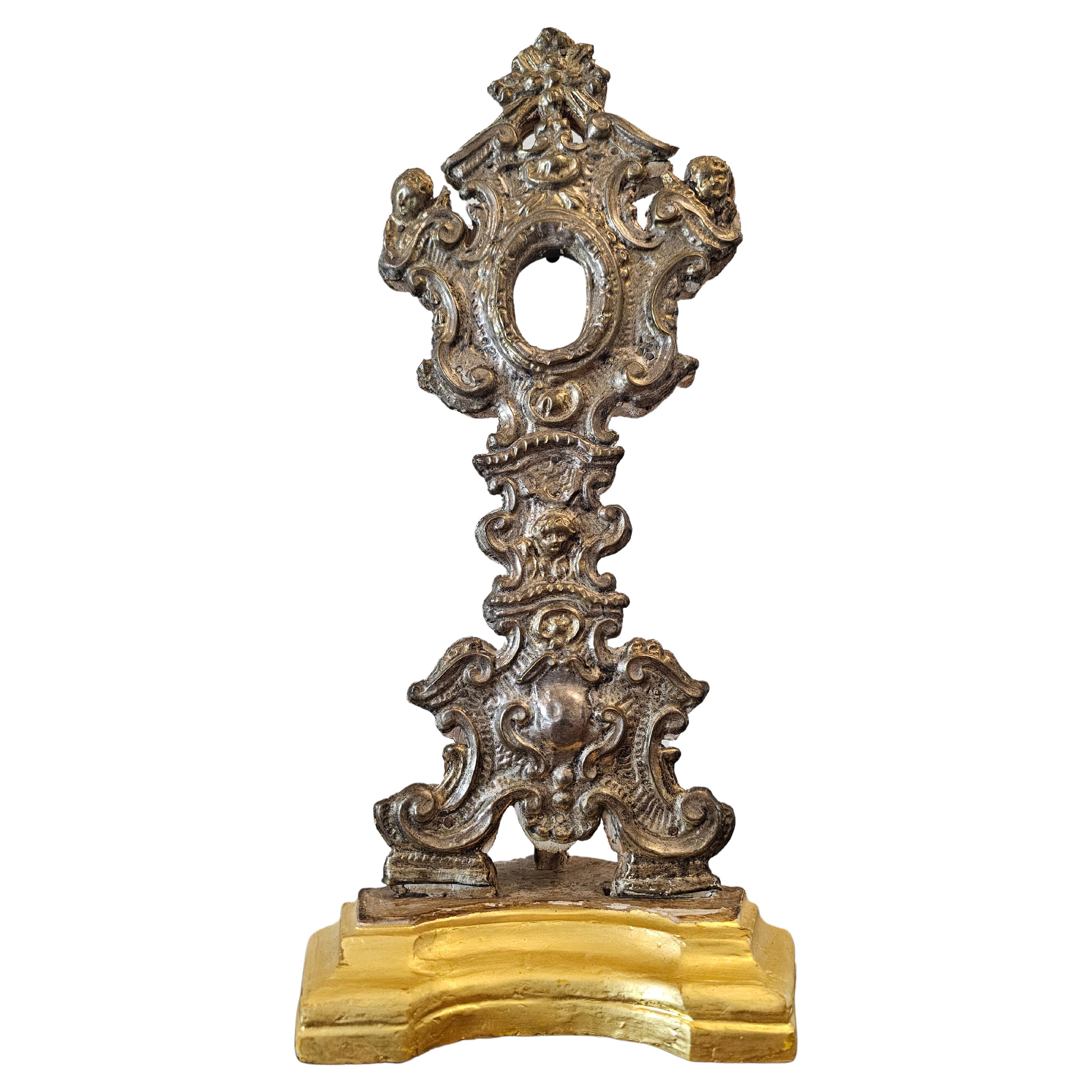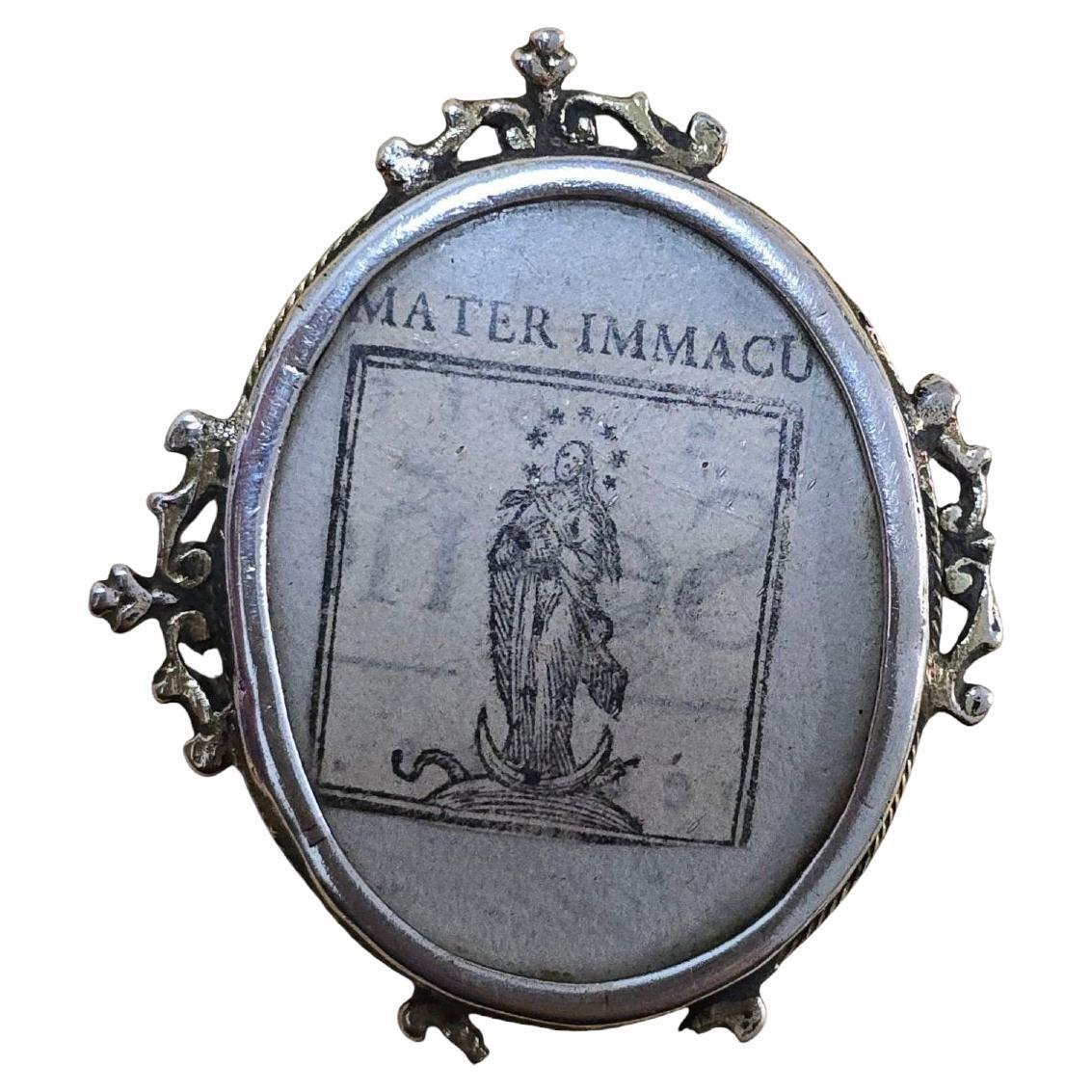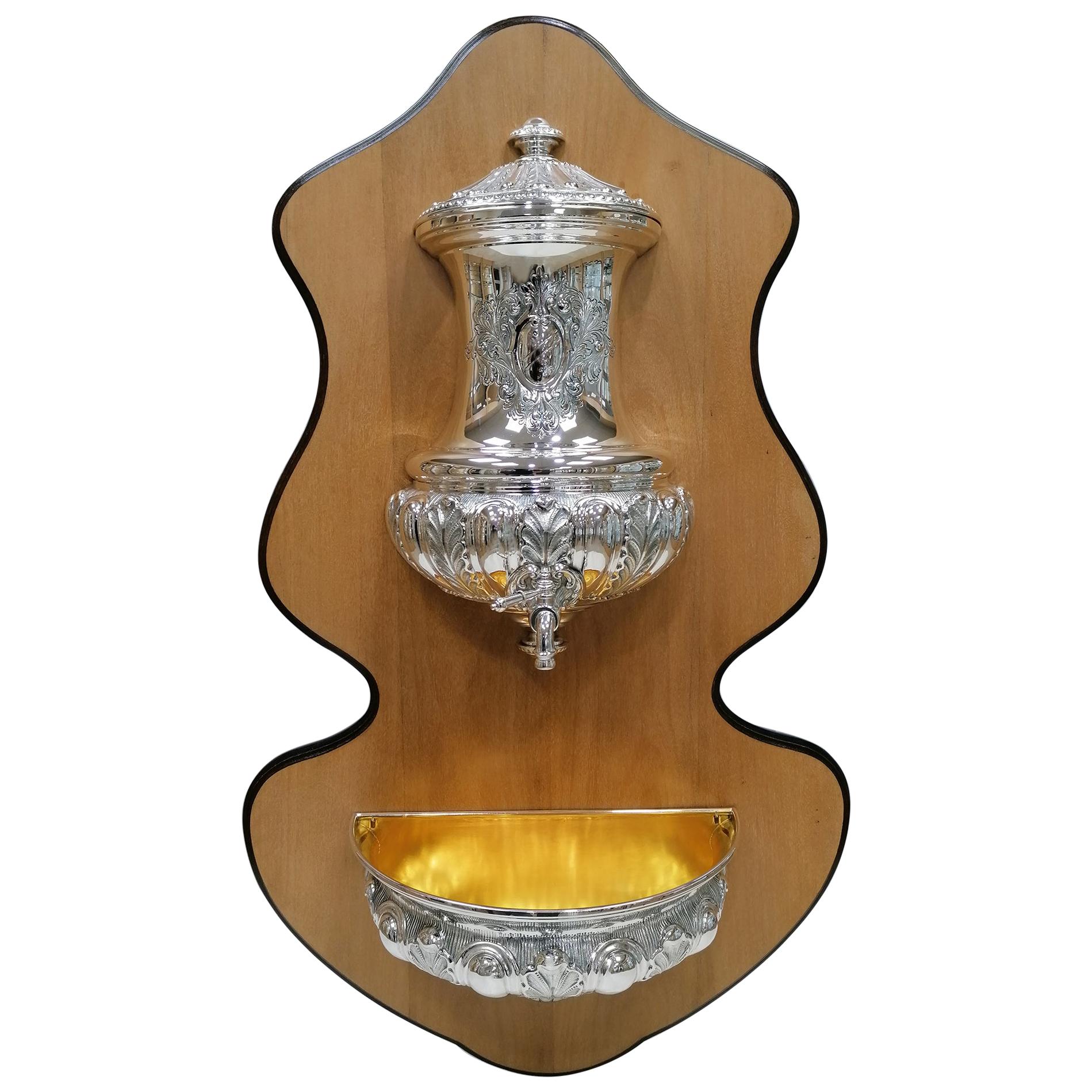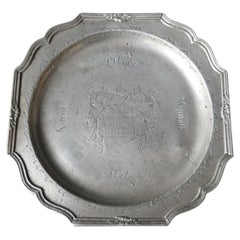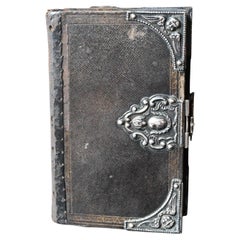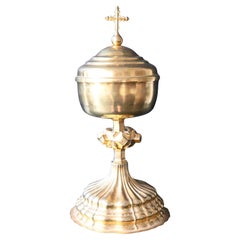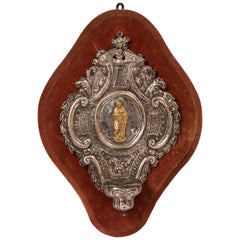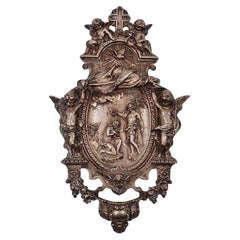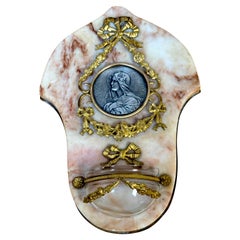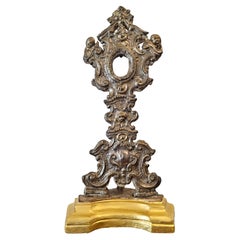Items Similar to Large Holy waterfont In Sterling Silver, 19th century
Video Loading
Want more images or videos?
Request additional images or videos from the seller
1 of 11
Large Holy waterfont In Sterling Silver, 19th century
$1,317.96
£980.95
€1,100
CA$1,805.27
A$2,007.86
CHF 1,048.44
MX$24,433.49
NOK 13,390.19
SEK 12,557.64
DKK 8,373.92
Shipping
Retrieving quote...The 1stDibs Promise:
Authenticity Guarantee,
Money-Back Guarantee,
24-Hour Cancellation
About the Item
Holy font in solid silver, hallmarked with 800
Holy font height 31 cm, width 19.5 cm, with rear shelf 38 x 28 cm
The silver waterfont can get taken of easely from it's background and displayed separate.
- Dimensions:Height: 14.97 in (38 cm)Width: 11.03 in (28 cm)Depth: 2.37 in (6 cm)
- Style:Baroque (In the Style Of)
- Materials and Techniques:
- Place of Origin:
- Period:
- Date of Manufacture:19th century
- Condition:Wear consistent with age and use. normal age traces.
- Seller Location:Bilzen, BE
- Reference Number:1stDibs: LU10361244693892
About the Seller
New to 1stDibs
Joined in the past six months.
5.0
Gold Seller
Premium sellers maintaining a 4.3+ rating and 24-hour response times
Established in 1987
1stDibs seller since 2025
7 sales on 1stDibs
Typical response time: <1 hour
- ShippingRetrieving quote...Shipping from: Bilzen, Belgium
- Return Policy
Authenticity Guarantee
In the unlikely event there’s an issue with an item’s authenticity, contact us within 1 year for a full refund. DetailsMoney-Back Guarantee
If your item is not as described, is damaged in transit, or does not arrive, contact us within 7 days for a full refund. Details24-Hour Cancellation
You have a 24-hour grace period in which to reconsider your purchase, with no questions asked.Vetted Professional Sellers
Our world-class sellers must adhere to strict standards for service and quality, maintaining the integrity of our listings.Price-Match Guarantee
If you find that a seller listed the same item for a lower price elsewhere, we’ll match it.Trusted Global Delivery
Our best-in-class carrier network provides specialized shipping options worldwide, including custom delivery.More From This Seller
View All18th Century Pewter Plate With Important Coat Of Arms, dated 1721
Located in Bilzen, BE
18th century pewter plate dated 1721 and engraved with an important coat of arms.
Makers marks on the back
Diameter, 23.8 x 23.7 cm.
Category
Antique 1720s Belgian Louis XV Historical Memorabilia
Materials
Pewter
Dutch Missal With Silver Mount, 1843
Located in Bilzen, BE
Dutch missal with solid silver mount, 1843 Gulpen, printed in Dutch
9.8 x 15.2 cm, thickness 4.2 cm
Category
Antique 1840s Dutch Baroque Religious Items
Materials
Silver
Antique Oval Basket In Solid Silver, Late 19th Century
Located in Bilzen, BE
A basket, solid silver basket, graded 800, of the late 19th century,
20 x 36 cm, height 7.5 cm, weight 480 g
Category
Antique Late 19th Century French Louis XIV Decorative Baskets
Materials
Silver
French Gilt Ciborium – Silver Cup, Louis XV Period (circa 1740–1760)
Located in Bilzen, BE
"French Gilt Ciborium – Silver Cup, Louis XV Period (circa 1740–1760)"
French Gilded Ciborium – Silver Bowl, Gilded Copper Base & Lid
Louis XV Period (c. 1740–1760) / Reassembled & H...
Category
Antique Mid-18th Century French Louis XV Religious Items
Materials
Silver, Copper
Museum Quality Antique Islamic Qajar Indo-persian Silver Vase
Located in Bilzen, BE
A museum quality antique silver vase from the end of the 19th century .
This heavy sterling silver vase is fully decorated and engraved with a breathtaking arabesque design with ...
Category
Antique Late 19th Century Turkish Islamic Metalwork
Materials
Silver
Bronze Sprinkler Bucket - Gothic Holy Water Font 15th/16th Century
Located in Bilzen, BE
Gothic bronze bucket with cylindrical molding, also serving as a portable bronze holy water font, dating from the 15th/16th century, used for sprinkling holy water.
Aged patina
Dimen...
Category
Antique 15th Century and Earlier German Gothic Religious Items
Materials
Bronze
You May Also Like
18th Century Spanish Silver Holy Water Font, Baroque Style with Gilt Virgin Mary
Located in Madrid, ES
This highly decorative silver holy water font or stoup, is stamped with hallmarks placing its manufacture in Aspiazu, Bilbao, Spain during the l...
Category
Antique Late 18th Century Spanish Baroque Religious Items
Materials
Silver
Holy water font depicting "The Baptism of Christ" in sterling silver - 20th
Located in Linkebeek, BE
Holy water font depicting "The Baptism of Christ" in sterling silver
Fine Art - Silver - Catholic
Measures : 18x3cm H: 29cm
Material : Sterling silver
Wear consistent with age and use
Category
Early 20th Century Religious Items
Materials
Sterling Silver
19th C. French 'Ave Maria' Bénitier / Holy Water Font, Devotional Reliquary
Located in West Palm Beach, FL
19th C. French 'Ave Maria' Bénitier / Holy Water Font, Devotional Reliquary
France, circa 1890s, artist signed 'Ale'
A stunning late 19th-century French Bénitier/Holy Water Font D...
Category
Antique Late 18th Century French Belle Époque Religious Items
Materials
Marble, Bronze, Ormolu
$700 Sale Price
20% Off
18th/19th Century Italian Baroque Silvered Metal Altar Monstrance Reliquary
Located in Forney, TX
A stunning antique Italian Baroque style silvered metal gilded wood monstrance reliquary. circa 1770-1820
Handmade in Italy in the late 18th / early 19th century, commissioned by the church to display an important religious relic, sculptural painted wood form, mounted with decorative silver repousse metal facing, open oval window where the philatory relic was once housed, rising on a gold gilt painted shaped plinth base.
Dimensions: (approx)
17" High, 8" Wide, 5" Deep, 1.25lbs
History:
Reliquaries (also referred to as a shrine or châsse in French), are containers used to protect and display relics. A portable reliquary may be called a fereter, and a chapel in which it is housed a feretory. A monstrance, also known as an ostensorium (or an ostensory), is a vessel used in Roman Catholic, Old Catholic, High Church Lutheran and Anglican churches for the display on an altar of some object of piety, such as the consecrated Eucharistic host during Eucharistic adoration or Benediction of the Blessed Sacrament. It is also used as reliquary for the public display of relics of some saints.
The use of reliquaries became an important part of Christian practices from at least the 4th century, initially in the Eastern Churches, which adopted the practice of moving and dividing the bodies of saints much earlier than the West, probably in part because the new capital of Constantinople, unlike Rome, lacked buried saints. Relics are venerated in the Oriental Orthodox, Eastern Orthodox, Roman Catholic and some Anglican Churches. Reliquaries provide a means of protecting and displaying relics. While frequently taking the form of caskets, they range in size from simple pendants or rings to very elaborate ossuaries.
The relics were enshrined in containers crafted of or covered with gold, silver, gems, and enamel. These objects constituted a important form of artistic production across Europe and Byzantium throughout the Middle Ages.
Many were designed with portability in mind, often being exhibited in public or carried in procession on the saint's feast day or on other holy days. Pilgrimages often centered on the veneration of relics. The faithful often venerate relics by bowing before the reliquary or kissing it; those churches which observe the veneration of relics distinguish between the honor given to the saints and the worship that is due to God alone.
Sixteenth-century reformers such as Martin Luther opposed the use of relics since many had no proof of historical authenticity and objected to a cult of saints. Many reliquaries, particularly in northern Europe, were destroyed by Calvinists or Calvinist sympathizers during the Reformation...
Category
Antique Early 19th Century Italian Baroque Sculptures and Carvings
Materials
Metal
18th-century reliquary in solid silver, finely hand-engraved
Located in Madrid, ES
Elegant 18th-century reliquary in solid silver, finely hand-engraved, with an ornamental decoration typical of Baroque religious art. Its oval shape features floral and symbolic deta...
Category
Antique 18th Century European Baroque Religious Items
Materials
Silver
20th Century Italian Solid Silver Holy Water Stoup with Tap
By Arval Argenti Valenza
Located in VALENZA, IT
Holy water stoup in 800 solid silver.
Made entirely by hand, embossed and chiseled with leaves and pods motif. The lid is removable to allow water to ...
Category
Vintage 1970s Italian Other Sterling Silver
Materials
Silver
$14,186 Sale Price
20% Off
More Ways To Browse
19th Century German Collectibles
Antique Font
800 German Sterling Silver
Russian Orthodox Icon
Wooden Crucifix
Italian Tabernacle
Jesus Crucified
Menorah Brass Israel
Antique Holy Water Font
Antique Mexican Religious
Silver Hanukkah Lamp
Christian Altar
Church Altar Table
French Wood Religious Statues
Torah Pointer
Antique Bronze Crucifix
Antique Wooden Crucifix
Ivory Christ
